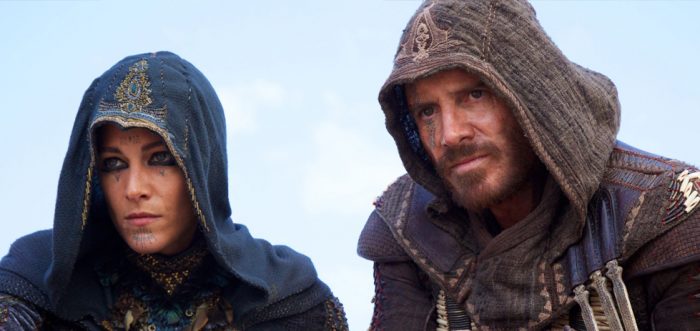
It is a truth universally acknowledged that translating video game stories to film is a difficult and thankless task – so much so that the most successful examples of the ‘video game’ film genre, Tron and Wreck it Ralph, aren’t based on real games at all. Justin Kurzel’s attempt to bring Ubisoft’s Assassin’s Creed franchise to the silver screen is a stylish but jumbled film, ultimately akin to a never-ending cutscene from a game you’re never allowed to play.
In a confused and confusingly told plot, Callum Lynch (Michael Fassbender), who watched his father kill his mother as a child and went on the run, is being held on death row after murdering a pimp.1 After he is pronounced dead, his body is brought to a more dystopian version of Joss Whedon’s Dollhouse run by a modern front for the Knight’s Templar and hooked into an elaborate VR rig called the Animus, created by Sofia Rikkin (Marion Cotillard), to connect with the DNA memories of a 15th century Spanish ancestor who was the last known person in possession of the Apple of Eden – which is either the cure for violence or an end to mankind’s free will, depending on which side you’re on. If that reads like a data dump, be thankful I haven’t also elaborated on the opening crawl that explains centuries of conflict between the Knights Templar and the Assassin’s brotherhood and the heavily subtitled medieval spain sequences that feel like early low memory games where actual VO wasn’t possible so characters just made noises with text on screen. The setup is excessive to get to the first real action scenes, and even these are few and far between, peppered between moralising about violence, a subplot involving Sofia’s father (Jeremy Irons) constantly claiming her discoveries as his own, and a community of other Assassins being kept in the facility with Lynch.
This narrative imbalance is one of the film’s biggest issues – so much time is spent in the facility that it feels like Kurtzel would have rather made a meditative science fiction piece about incarceration and aggression, in the style of A Clockwork Orange or One Flew Over The Cuckoo’s Nest, and found himself having to work in an Assassin’s Creed movie. Actually keeping up with the plot machinations is a struggle simply because there are so many threads, all of which (wrongly) assume the audience is able to understand every nuance the team of six screenwriters intended to be read. The other Assassins in the facility, including a criminally underused Michael K Williams, are protective of the Brotherhood’s secrets, although what those actually are isn’t particularly clear – one scene ends with a confused Lynch verbalising the audience’s thoughts with a wink and a nudge and a “What the fuck is happening” which would have landed if there was any attempt to actually clear up what the fuck was happening. It’s a surprisingly short film too, and its ending doesn’t play into the trappings of film franchise teases- instead nothing short of a high budget miniseries could sort through the litany of loose ends and missing character development, and if it’s anything like this film, it’ll probably only get around to that in its later episodes.
Design is the film’s forte – the film is at its best when it plays into the game’s textured world and swooping shots of people standing on tall things. The costume and weaponry, as well as the physical sets, are faithful to the games and also feel at home on screen. Fight scenes suffer, though, as the relentless focus on maintaining this larger style take us to a point where individual punches and choreography are incomprehensible – a fact not helped by the tightly focused shaky cam. At times, too, it’s hard to tell whether the filmmakers are trying to be very faithful to the look of the game or that the CGI really is that bad. Kurzel’s well documented love of smoke and dramatic lighting are on full show, and in some scenes are genuinely impressive, but in others are distracting and confusing.
It’s hard to tell whether a more cohesive Assassin’s Creed film could have come from focusing on the Creed itself, but that would have involved a lot more subtitles – as it is, Assassin’s Creed is yet another failure for in the realm of video game film adaption.
